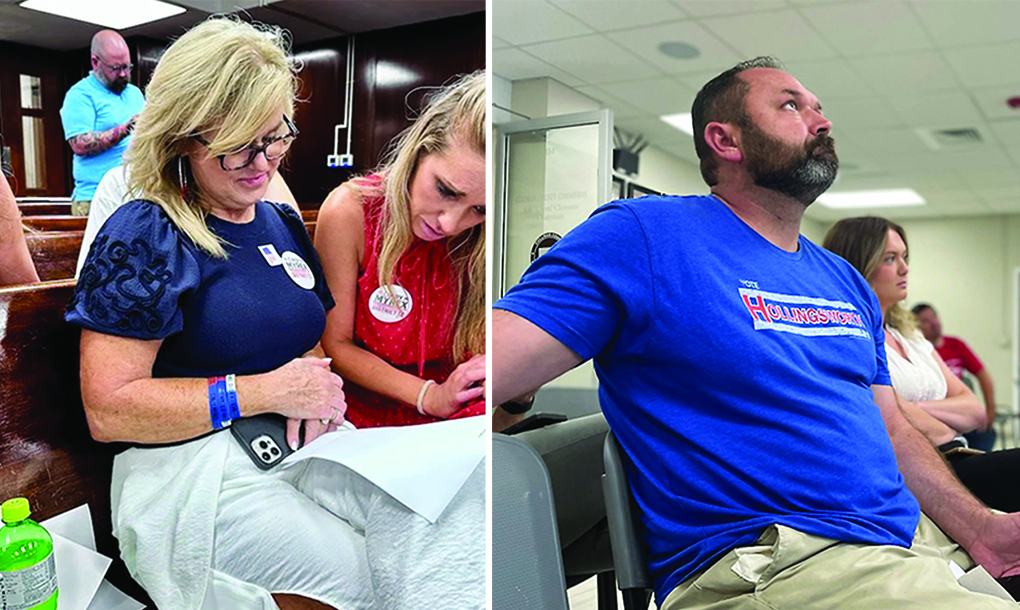Bibles in POW displays draw controversy
Published 1:30 pm Friday, May 6, 2016
WASHINGTON – For years, prisoners of war and soldiers missing in action have been remembered with displays of empty chairs around tables with a Bible.
But now the “Missing Man Tables” are putting the Department of Veterans Affairs in the middle of a dispute over the use of religious symbols in the military.
Trending
The tradition at three VA clinics in Texas and Ohio has drawn complaints from those who believe the government shouldn’t favor Christianity over other faiths or those who practice no faith.
But when the Bibles disappeared earlier this year from VA displays, religious groups were outraged.
The Congressional Prayer Caucus, which says it defends the free expression of religious beliefs, is demanding answers.
The U.S. Constitution may bar the government from creating a state religion, wrote the co-chairmen of the caucus, Sen. James Lankford, R-Oklahoma, and Sen. Randy Forbes, R-Virginia, in a letter to Veterans Affairs Secretary Robert McDonald on April 28.
But that “does not prohibit the government from from referencing religion altogether, nor does it require that the government scrub all references of religion from the public square,” the senators wrote.
Missing Man Tables, with empty chairs representing each of six branches of the military, are set with a number of symbols, according to The National League of POW/MIA Families’ website.
Trending
A white tablecloth symbolizes “the purity of their motives when answering the call to serve.” A single red rose symbolizes “the lives of those Americans, and their loved ones and friends who keep the faith while seeking answers.”
The Bible represents “strength gained through faith to sustain us and those lost from our country, founded as one nation under God,” the website states.
The VA removed Bibles from the display at the Michael E. DeBakey VA Medical Center in Houston, as well as clinics in Youngstown and Akron, Ohio, and at Wright Patterson Air Force Base near Dayton, after receiving complaints from the Military Religious Freedom Foundation. The group opposes the use of religious symbols in the military.
“It’s simple, if people want to have private displays, that’s great,” its president, Mikey Weinstein, said in an interview.
The use of only a Bible in a government facility “is an endorsement or a validation of one particular faith over another,” he said.
“It creates the belief that the only POWs or MIAs worth remembering are those in the Christian faith,” he said.
Maureen Dyman, spokeswoman for the DeBakey VA, said the hospital received complaints from several veterans including a former prisoner of war who was not a Christian, after the table was set up in 2015.
Some patients asked for a Quran or a Hebrew Bible to be placed on the table, as well, she said.
“The VA does not endorse or promote any one religion over another,” she said. The center removed the Bible “in order to avoid any controversy and division that could distract from the table’s primary purpose of honoring POW/MIAs.”
In addition to Lankford and Forbes, 39 House and Senate members expressed concern over the Bibles’ removal in the letter to McDonald. Among them were Republican Sens. James Inhofe of Oklahoma, Ted Cruz of Texas, Marco Rubio of Florida, and Roy Blunt of Missouri.
The controversy is the latest over Bibles at military installations.
The Navy in 2014 removed Bibles from Navy Lodge guest rooms after Weinstein’s group complained. It later returned them when religious groups protested.
Ron Crews, executive director of the Chaplain Alliance for Religious Liberty, said he understands those of other faiths may feel excluded by the Bibles on Missing Man Tables.
But that’s not the intent, said Crews, a retired Air Force chaplain.
The tables have been around for decades, and the Bibles are only meant to “represent the faith of the soldier in the form of our sacred text.”
Removing them puts government in the position of endorsing secularism over religion, he said.
“Military personnel are not just physical beings,” he said. “They’re spiritual beings, as well.”
Kery Murakami is the Washington, D.C. reporter for CNHI’s newspapers and websites. Reach him at kmurakami@cnhi.com.






